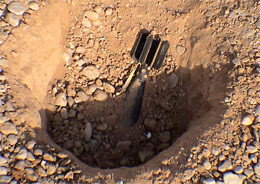Electronic Lebanon 4 July 2007

Deminers say removing the immediate unexploded ordnance threats from Nahr al-Bared will take at least a month. (Hugh Macleod/IRIN)
This raises the specter of further unrest among displaced refugees increasingly desperate to return home.
“The operation should take around four weeks to eliminate the immediate threats, but there is bound to be UXO still found,” David Horrocks, Lebanon Country Programme Manager for the Mines Advisory Group (MAG), told IRIN.
“It is going to be very difficult to stop people going back, and it’s important we let the Palestinians know they are returning. But our concern is that the more people who go back the more difficult our job becomes.”
Nearly 35,000 Palestinian refugees have been displaced since the 20 May outbreak of conflict in the northern Nahr al-Bared camp, near Tripoli. The vast majority have settled with families or are temporarily sheltered in cramped, fraught conditions in neighboring Baddawi camp.
On 29 June three Palestinians were shot dead and at least 50 were wounded when soldiers fired into a crowd of around 2,000 irate demonstrators demanding to be let back into Nahr al-Bared. The army said it had fired warning shots, but the demonstrators refused to disperse.
The incident came as mediators from the Palestinian Clerics Association said they had halted their efforts to negotiate a cease-fire between the army and the al-Qaeda-inspired Fatah al-Islam militants holed up in the camp.
Social problems growing
With frustration among displaced Palestinians growing by the day, relief agencies are struggling to keep a lid on social and psychological problems.
The UN’s Palestinian relief organization, UNRWA, has not yet gone ahead with controversial plans to build temporary accommodation for the displaced in Baddawi — criticized by some Palestinians as a form of re-settlement — citing a lack of available free land.
“We have enough humanitarian assistance to meet needs in Baddawi, but now we are seeing social and psychological problems,” said Hoda al-Turk, spokeswoman for UNRWA.
“We fully understand the frustration felt among the refugees, who are jobless, living in the heat and feeling trapped. We are getting the message out that we are preparing a plan for their return to try and relieve the stress.”
Cash assistance from Saudi Arabia is expected to be distributed in the coming days to around 10,000 families in Baddawi as well as Lebanese families affected by conflict on the outskirts of Nahr al-Bared.
No green light until UXO cleared
However, UNRWA said it would not enter the camp until given the green light to do so by MAG, whom it has contracted to make an initial security assessment — assessing UXO, such as 155mm artillery shells, tank rounds and mortars, as well as the condition of the buildings, many of which have been severely damaged or booby trapped by Fatah al-Islam.
MAG will then create a humanitarian corridor for delivery of water, food and medical aid to those still living in the camp. The army has refused permission for the delivery of food or water into Nahr al-Bared since 22 June, according to Virginia de la Guardia of the International Committee of the Red Cross (ICRC), which continues to negotiate with all parties to allow relief into the camp.
The last wounded person to be evacuated from the camp was on 27 June. La Guardia said the ICRC does not think anyone in the camp is starving, but said water supply could become “a major problem”.
Only after UNRWA has entered and disinfected the camp will it give the official green light for refugees to re-enter, though the agency is concerned many people will try to return home before it is safe to do so.
“We don’t want people who survived the war to die from UXO when they go back home,” said Turk.
MAG said it has been ready for the last three weeks to enter Nahr al-Bared once it gets the green light from the army, which is already undertaking demining operations around its positions across the New Camp, the area of Nahr al-Bared outside the official camp boundary. MAG will undertake demining inside the official boundary of the camp, known as the Old Camp.
Aware of the dangers
Both the UN Children’s Agency (UNICEF) and the ICRC have launched campaigns to raise awareness of the dangers posed by UXO.
UNICEF has built on existing long-running UXO awareness programs and has been training 100 Palestinian volunteers in Baddawi to teach young people about what to expect when they return to their homes.
The agency has also distributed thousands of posters, leaflets and banners with pictures and instructions on how to avoid triggering munitions and to report them to the National Demining Office. The ICRC has also distributed 25,000 UXO awareness brochures in Baddawi and in mosques and schools near the camp.
This item comes to you via IRIN, a UN humanitarian news and information service, but may not necessarily reflect the views of the United Nations or its agencies. All IRIN material may be reposted or reprinted free-of-charge; refer to the copyright page for conditions of use. IRIN is a project of the UN Office for the Coordination of Humanitarian Affairs.
Related Links


